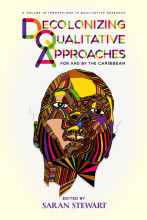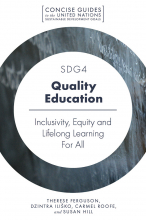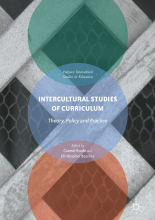

As academics in postcolonial Caribbean countries, we have been trained to believe that research should be objective: a measurable benefit to the public good and quantifiable in nature so as to generalize findings to develop knowledge societies for economic growth. What happens, however when the very word “research” connotes a derogatory term or semblance of distrust? Smith (1999) speaks towards the distrustful nature of the term as a legacy of European imperialism and colonialism. Against this backdrop, how do Caribbean researchers leverage recognized and valued (indigenous) methods of knowing and understanding for and by the Caribbean populace? Decolonizing qualitative methods are rooted in critical theory and grounded in social justice, resistance, change and emancipatory research for and by the Other (Said, 1978). This edited volume provides a collective body of scholarship for innovative uses of decolonizing qualitative research.
Read more
In Reimagining Educational Leadership in the Caribbean, Canute S. Thompson contends that postmodernism ought to be the guiding construct in considering leadership in education and management. Postmodernism challenges convention, embraces otherness and champions the diversification of authority. Drawing on his original theory of Proposition MRM (modelling, respect, motivation), Thompson explores issues that face educational and other leaders in the Caribbean in a manner that has not yet been undertaken so extensively. The author examines the relationship between Proposition MRM and various elements of educational policy and practice, including critical thinking, ethics, pedagogy, sustainable development, and technical and vocational education and training.
Reimagining Educational Leadership in the Caribbean is practitioner-sensitive and written in a non-technical style, making it accessible to educators at all levels and all those interested in social change.
Read more

SDG4 - Quality Education: Inclusivity, Equity and Lifelong Learning For All explores the multifaceted and complex nature of the concepts of inclusivity and quality education. Drawing examples from two different country contexts (Latvia and Jamaica), the book explores how and why inclusive and quality education is critical to sustainable development. It considers the indicators of inclusive and quality education, how the concept of education for sustainable development is evolving, and the ways in which these indicators are being pursued. The book pays specific attention to the roles of teachers, teacher educators, and the curriculum in the attainment of inclusive and quality education and 21st Century skills for a sustainable society.
Read more
Quality in Higher Education in the Caribbean explores underrepresented areas and cutting-edge topics such as massive online open courses; ethics in quality assurance; administrative support in quality, tertiary technical and vocational education and training; legislative frameworks; and strategic planning. It closes with a projection into the future of quality assurance and enhancement for the region that takes account of international and regional trends in global accreditation standards, accountability of external quality assurance agencies, and online courses and cross-border education. A must-read for postgraduate students, higher education managers and quality assurance practitioners.
Read more
This book explores the philosophical, ideological and practical dimensions of curriculum using an intercultural lens. It is cross-cultural, comparative and inclusive, with each chapter featuring case studies from a minimum of three countries across different continents. By using the same methods of data collection and analysis for each country level in each chapter, the text explores relationships of curriculum theory, policy and practice both within and between countries. A diverse range of themes is explored, including; social justice and teacher preparation curriculum, language education curriculum, early childhood education and music, curriculum as praxis, curriculum and globalisation, science curriculum, teacher leadership in curriculum implementation, as well as curriculum and history. The exploration of these themes lays the foundation for open dialogue and innovative approaches in exploring curriculum issues within, between and across cultures and contexts.
Read more
Social Media